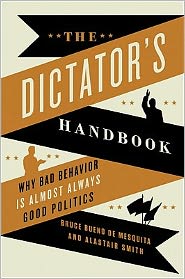It gives an entertaining and balanced portrait of Marx, Engels, their colorful milieu of exiles, freaks and revolutionaries, and the little-known Marx family, dominated by Karl’s political obsession. It also details illicit love affairs, the deaths of children and financial struggles, all based on vast research and narrated with empathetic passion. At the same time, it is too long by 200 pages and often undermined by flagrantly purple throbbings, minor mistakes and portentous overegging.The NYT gives top billing, however, to Who's Afraid of Post-Blackness? What It Means to Be Black Now (Free Press), by Touré.
Here's the first paragraph of the review, by Orlando Patterson:
Much has been written on the benefits that accrued to the generation of African-Americans reaping the rewards of the civil rights revolution. But we have heard surprisingly little from those in the post-civil-rights age about what these benefits have meant to them, and especially how they view themselves as black people in an America now led by a black president. In his new book, Touré’s aim is to provide an account of this “post-black” condition, one that emerged only in the 1980s but by the ’90s had become the “new black.”Patterson describes the book as "one of the most acutely observed accounts of what it is like to be young, black and middle-class in contemporary America," and the author's voice as "often humorous, occasionally wary and defensive, but always intensely engaging." For more on the book, listen to the podcast, here.
Also reviewed: film critic Roger Ebert's memoir (here), and Laurence Bergreen's biography of Christopher Columbus (here).
 In the Wall Street Journal book pages, you'll find a review of The Dictator's Handbook: Why Bad Behavior Is Almost Always Good Politics (PublicAffairs), by political scientists Bruce Bueno de Mesquita and Alastair Smith (here). It is "a lucidly written, shrewdly argued meditation on how democrats and dictators preserve political authority." Here's a bit more:
In the Wall Street Journal book pages, you'll find a review of The Dictator's Handbook: Why Bad Behavior Is Almost Always Good Politics (PublicAffairs), by political scientists Bruce Bueno de Mesquita and Alastair Smith (here). It is "a lucidly written, shrewdly argued meditation on how democrats and dictators preserve political authority." Here's a bit more:One might presume that a badly handled natural disaster greatly shortens time in office. It does—but only in democracies. Dictators, the authors argue, should view mass death by natural disaster as good politics. This is a jarring assertion, but consider that the higher the death toll in a democracy, the less likely an incompetent government is to be re-elected. The higher the death toll in an autocracy, however, the more money leaders can extract from foreign governments and aid agencies, money that is then used to strengthen the position of government loyalists.Also in the WSJ: reviews of Signing Their Rights Away: The Fame and Misfortune of the Men Who Signed the United States Constitution (Quirk), by Denise Kiernan and Joseph D'Agnese (here); and Hemingway's Boat: Everything He Loved in Life, and Lost, 1934-1961 (Knopf), by Paul Hendrickson (here).
The Washington Post covers The Magnificent Medills: America's Royal Family of Journalism During a Century of Turbulent Splendor (Harper), by Megan McKinney, and Newspaper Titan: The Infamous Life and Monumental Times of Cissy Patterson (Knopf), by Amanda Smith. Critic Jonathan Yardley describes the first as a "good book about Joseph Medill and his descendants," "predatory newspaper barons whose influence on American journalism was considerably more malign than salubrious." The second is "a rather less good book about Medill’s granddaughter," who in Yardley's view was hardly the "titan" claimed.
Also reviewed in the Post:
Journalist Ron Suskind's Confidence Men: Wall Street, Washington, and the Education of a President (Harper). The review is mixed ("In the end, I wondered if the author himself were the real confidence man, the ultimate untrustworthy narrator.").
Nassir Ghaemi's "psychological history," A First-Rate Madness: Uncovering the Links Between Leadership and Mental Illness (Penguin Press). According to the review, Ghaemi uses profiles of eight arguably mentally ill leaders and a control group of "normal" ones to argue that "[i]n times of crisis, we are better off being led" by the former than the latter.
This week the New Republic covers Steven Brill's Class Warfare (Simon and Schuster). In reviewer Richard Kahlenberg's estimation:
Brill’s portrait of school reform in America is highly seductive. It would be very nice to believe that if only unions would get out of the way, we could make enormous strides with fairly simple changes in school governance and human capital policies. But like the film Waiting for Superman before it, Class Warfare is highly misleading and often simplistic.For other reviews, see our earlier round-ups, here and here.
Over at the Los Angeles Times, you'll find coverage of Hughes After Howard (Sea Hills Press), an insider's account of Hughes Aircraft Co. after the departure of its eccentric founder. According to the review, the book should appeal to historians, scientists, and engineers.
Also covered: American Dreamers: How the Left Changed a Nation (Knopf), by Michael Kazin (here).
A new issue of the New York Review of Books is out. Mark Danner's essay "After September 11: Our State of Exception" is open access. Subscribers may also want to check out Russell Baker's "Anarchists and Capitalists," a review of Emma Goldman: Revolution as a Way of Life (Yale University Press), by Vivian Gornick, and The President and the Assassin: McKinley, Terror, and Empire at the Dawn of the American Century (Random House), by Scott Miller.
There is some good stuff in the Nation this week. Subscribers may read "The Truth About the Civil War," by Eric Foner ("Too many Americans have fallen prey to narratives that erase the role of slavery in the war’s origins and legacy.") and Aziz Rana's take on Malcolm X, by Manning Marable ("A biographer's flawed attempt to rediscover the politics in the decidedly political life of Malcolm X.").
The UK magazine History Today offers short reviews of The Origins of the English Parliament, 924-1327 (Oxford University Press), by J. R. Maddicott (here); Simon Wiesenthal: The Life and the Legends (Jonathan Cape), by Tom Segev (here); and The Death Marches: The Final Phase of Nazi Genocide (Belknap Press), by Daniel Blatman (trans. Chaya Galai) (here), among others.





